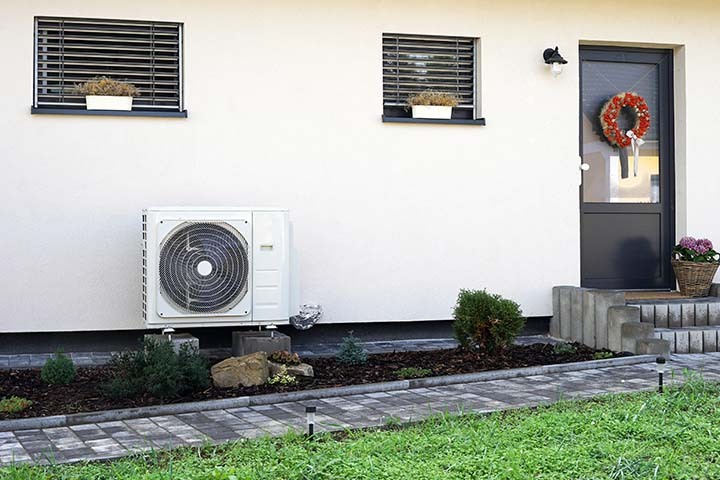Table of Contents
Heat pumps are becoming more and more popular in the UK as we are moving towards 2050. The reason seems to be the spread of awareness about renewable energy and the use of solar panels that can completely change the game.
More reliance on renewable energy and less on biomass or fossil fuel means a more environment friendly living. Many people choose heat pumps because they save energy and reduce annual bills.
The UK government also offers grants to make them affordable for eligible homeowners whose households claim certain government benefits.
But heat pumps also have some drawbacks. They may not work well in very cold weather. In this blog, we will discuss the pros and cons of using heat pumps in 2025.
Why Are Heat Pumps Becoming More Popular Now?
Being environmentally friendly and energy efficient heat pumps are becoming more and more popular. Heat pumps are encouraged by the UK government as means of lowering carbon emissions.
Rising petrol prices have more people choosing heat pumps. Excellent renewable energy source since heat pumps run well with solar panels.
Many householders view them as a long-term heating source. Heat pump installation’s upfront cost is lowered in part by the Boiler Upgrade Scheme Since heat pumps are also getting more sophisticated and fit for many kinds of homes. Heat pumps are a wise investment for the future given their reduced running costs and improved efficiency.
Air Source Heat Pump Grants
Pros of Using Heat Pumps
1. Energy Efficient
Comparatively to conventional heating systems, heat pumps consume less electricity. They transfer heat into the house from the ground or the air. Less energy is used in this process than in burning petrol or oil.
On their electricity bills, homeowners can save money. Heat pumps also fit perfectly with solar panels, therefore lowering expenses even more. Those who wish to preserve energy will find them to be excellent choices.
2. Eco-Friendly
Less carbon dioxide is created by heat pumps than by gas boilers. They generate heat not by burning fossil fuels. Rather, they move earth, water, or air heat.
This promotes fight against climate change and helps to lower pollution. More homes using heat pumps means less harm to the environment. The UK government supports heat pumps to meet its carbon reduction targets.
3. Long Lifespan
If kept well, a heat pump should last 15 to 20 years. This spans more than many gas boilers. Frequent service keeps them running as intended. Many manufacturers provide heat pump lengthy warranties.
Homeowners hardly need to update them very often. This lends them dependability as an investment.
4. Provides Heating and Cooling
Heat pumps run in both winter and summer. They bring warmth inside in cold months. Like air conditioners, they cool the house in hot months. This makes them more useful than traditional boilers. People do not need to buy separate cooling systems.
5. Low Maintenance
Heat pumps do not need frequent repairs. They have fewer moving parts than gas boilers. Homeowners only need to clean filters and check refrigerant levels. A professional check-up once a year is enough. This saves money on maintenance costs.
6. Grants and Incentives
The UK government offers grants to help people install heat pumps. The ECO4 Scheme gives financial help to homeowners. This reduces the cost of buying and installing a heat pump. Some energy companies also offer incentives. This makes switching to heat pumps easier.
Cons of Using Heat Pumps
1. High Installation Cost
Heat pumps cost more than gas boilers because of more complexity in installation. Even with grants, homeowners may struggle to afford them. Some people need to upgrade insulation and radiators, adding extra costs. This makes it hard for some families to switch to heat pumps.
2. Not Always Efficient in Cold Weather
Heat pumps classified as air-source draw heat from the air. Less heat exists to absorb in really cold conditions. This reduces their efficiency.
Backup heating systems could be required of homeowners. Though they cost more to install, ground-source heat pumps perform better in colder climates.
3. Requires Space
Heat pumps require room both inside and outside of the house. The external unit of air-source heat pumps is rather huge. Ground-source heat pumps call for pipes buried in the yard.
Some houses lack the room needed for these systems. Flats and small houses may struggle to install heat pumps.
4. Complex Installation
Installing a heat pump calls for time and preparation. One could need several days to finish. Correct installation of the system depends on professionals for homeowners.
Less efficiency of the heat pump can result from poor installation. This emphasizes the need of appointing competent experts.
5. Noisy Operation
Air-source heat pumps produce noise. The outdoor unit hums when operating. This can be disruptive to neighbors. Ground-source heat pumps are quiet but more expensive. Homeowners must think about noise levels prior to installing a heat pump.
6. Electricity Costs
Heat pumps run on electricity. If electricity prices rise, running costs may increase. Gas is sometimes cheaper than electricity. This means some people may not save much on bills. Using solar panels can help reduce electricity costs.
The Future of Heat Pump Technology
Heat pumps are getting smarter every year. New generation models are enhancing heat pump performance to make them perform better during cold weather conditions. Scientists are creating more intelligent heat pumps that adapt to weather conditions automatically.
Heat pumps will be quieter, more compact, and easier to install. More houses will have underfloor heating with heat pumps for improved warmth. Heat pumps and gas boilers will be combined into hybrid systems for flexibility. Installation costs of heat pumps could fall as technology advances.
Ground-source and air-source heat pumps and other renewable energy sources are driving heating solutions’ future towards A major component of UK strategy to lower carbon emissions and build a better future is heat pumps.
The Bottom Line
Energy-efficient heating and cooling can benefit much from heat pumps. They cut energy bills and assist to lessen carbon emissions. They demand less maintenance and last longer than gas boilers as well. Heat pumps have several shortcomings, though.
Their installation costs are high, and they could not perform effectively in quite cold conditions. Homeowners require sufficient area for installation.
Notwithstanding these problems, heat pumps make a wise long-term investment. Before deciding on a heat pump, people should take home type and budget into account.
Frequently Asked Questions
Although heat pumps have high installation costs and need space, they are environmentally benign and energy-efficient.
In extreme cold, air-source heat pumps decrease efficiency; ground-source heat pumps work better in such circumstances.
A properly kept heat pump is a long-term investment since it can run 15 to 20 years.
To assist with heat pump installation expenses, the UK government does subsidies like the ECO4 Scheme.



